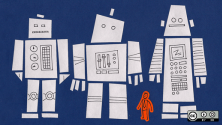Triple yields of cocoa crops. New lives for 6.5 million poor farmers on small farms in developing nations. More sustainable chocolate for you. Those are the goals of a collaborative team crossing public and private organizations that has been working to improve the cocoa growing process to benefit the world’s cocoa farmers and help lead us to a more sustainable world cocoa supply.
They've also finished three years ahead of schedule. And after only a little over two years of work unlocking the Theobroma cacao genome, the team didn't call the patent office. Instead, they released their first findings into the public domain. They say that by opening it up to the public, it will help breeders grow more robust, higher yielding, and drought- and disease-resistant trees.
“As the global leader in cocoa science, we understand the importance of not only investing in this research, but making it publicly available for all to benefit,” said Howard-Yana Shapiro, Ph.D., global head of plant science and research at Mars, Incorporated. “Although it may not benefit the bottom line in the short term, in the long run, it will ensure mutually beneficial results for the company, cocoa farmers and tree crop production in key regions of the world.”
The collaboration includes researchers and experts from Mars, USDA-ARS, IBM, NCGR, Clemson University, HudsonAlpha Institute for Biotechnology, Indiana University, and Washington State University.
The results of their research will be made available through the Cacao Genome Database to ensure that the data remains perpetually open without patent. The release is being done prior to formal peer-reviewed publication so that scientists can begin applying the findings immediately to crop cultivation efforts. The research team will now continue to improve analyze the genome sequence in preparation for publication in a peer-reviewed journal.
“By assembling the sequence fragments into the complete genome sequence and developing a detailed genetic map, we can help maximize the potential yield and income for cocoa farmers and catalyze future research and endeavors involving the cacao tree," said Ajay Royyuru, senior manager, IBM Computational Biology Center.
Cocoa is one of the world's top ten agricultural commodities. The seeds of the cacao tree are processed into the cocoa beans that become our cocoa, cocoa butter, and chocolate. But the farmers have always been plagued by losses of up to 80% of the crop, equal to about $700 to $800 million each year, from pests and diseases. Until now, there was little scientific research towards solving those problems.
“The talent and dedication brought together through this partnership is unmatched,” Shapiro said. “Our work is not over, however – we have a shared responsibility to continue our research and release new information to the public as we continue on this path of discovery.”
Learn more at cocoasustainability.com or cacaogenomedb.org.







1 Comment